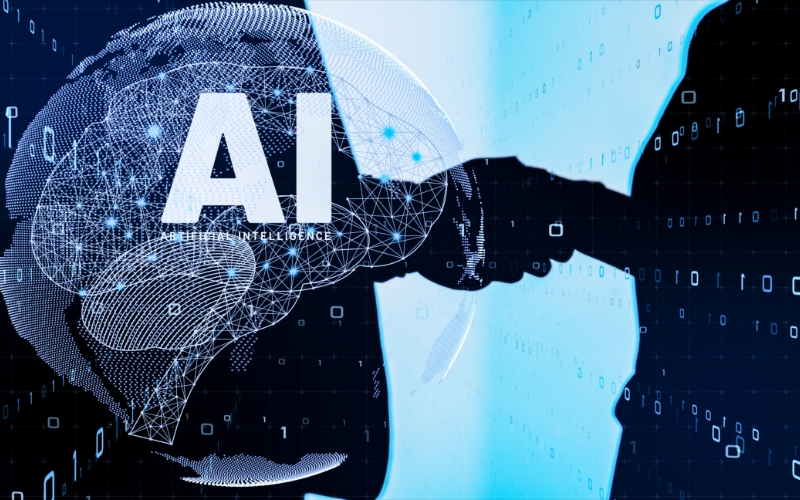- The Growing Role of AI in Executive Recruitment
- AI-Powered Tools Transforming Talent Acquisition
- Benefits of AI in Hiring for the Medical Device Industry
- Challenges and Ethical Concerns in AI-Driven Recruitment
- The Future of AI in Executive Recruitment for Medical Device Companies
- Conclusion - How AI is Changing Executive Recruitment in Medical Device Industry
The medical device industry is evolving rapidly, and so are the methods used to recruit top executives. AI is Changing Executive Recruitment by introducing automation, predictive analytics, and data-driven decision-making to the hiring process. With AI-powered tools, companies can streamline talent acquisition, reduce hiring biases, and identify the best candidates with greater accuracy. As competition for leadership roles intensifies, AI is transforming how organizations attract and assess top talent, making executive recruitment more efficient and strategic than ever before.
The Growing Role of AI in Executive Recruitment

AI is revolutionizing the way companies approach hiring, especially in executive recruitment. With advanced data analytics and machine learning, businesses can now identify top talent faster and more efficiently than ever before. AI is Changing Executive Recruitment by automating time-consuming tasks, such as resume screening, candidate sourcing, and initial interview processes. This allows hiring managers to focus on strategic decision-making rather than manual filtering.
One of the key reasons AI is Changing Executive Recruitment is its ability to process vast amounts of data at incredible speeds. Traditional hiring methods often rely on manual assessments, which can be prone to human bias and inefficiency. AI-powered algorithms, on the other hand, analyze candidate profiles based on skills, experience, and cultural fit, providing data-driven insights that improve the overall hiring process. For executive roles in the medical device industry, where precision and expertise are critical, AI helps identify the most suitable candidates with a higher degree of accuracy.
Additionally, AI enhances recruitment through predictive analytics, assessing potential candidates based on historical hiring patterns and industry trends. This predictive approach enables companies to anticipate future leadership needs and build a pipeline of highly qualified executives. Moreover, AI-driven chatbots and virtual assistants streamline candidate engagement, ensuring a smooth and responsive hiring experience.
As companies embrace AI-driven tools, the role of recruiters is also evolving. While AI enhances efficiency, human oversight remains essential to interpreting results, assessing leadership qualities, and ensuring a cultural fit. The combination of AI-powered automation and human expertise is shaping a new era in hiring, proving that AI is Changing Executive Recruitment in ways that optimize efficiency, reduce bias, and elevate talent acquisition strategies.
“AI is reshaping executive hiring, but which roles are most in demand? Find out in The Most In-Demand Executive Roles for 2025.”
AI-Powered Tools Transforming Talent Acquisition
AI-powered tools are transforming talent acquisition by streamlining and optimizing the executive recruitment process. With machine learning and predictive analytics, companies can identify high-potential candidates with greater precision. AI is Changing Executive Recruitment by automating resume screening, reducing the time spent on manual evaluations, and ensuring that only the most qualified professionals move forward in the hiring process. This is particularly valuable in the medical device industry, where leadership roles require a strong blend of technical expertise and business acumen.
Predictive analytics is another game-changer in modern recruitment. AI evaluates vast datasets, assessing patterns in successful executive hires and forecasting which candidates are most likely to excel in leadership positions. This allows recruiters to make more informed decisions, reducing the reliance on gut instincts. By leveraging AI-driven tools, companies can proactively identify talent, ensuring they have access to top executives before competitors. AI is Changing Executive Recruitment by making talent identification a data-driven, strategic process rather than a reactive one.
AI chatbots and virtual assistants have also improved candidate engagement by providing real-time responses and scheduling interviews efficiently. These AI-driven tools enhance the applicant experience by keeping candidates informed, answering queries instantly, and maintaining smooth communication throughout the hiring process. In a competitive job market, responsiveness is key to attracting top talent, and AI ensures that companies can interact with executives without unnecessary delays.
Additionally, AI-powered assessments evaluate leadership qualities, cultural fit, and decision-making abilities through sophisticated algorithms. This ensures that companies don’t just hire candidates based on their resumes but also assess their potential impact on the organization. As AI continues to evolve, AI is Changing Executive Recruitment by making hiring more strategic, efficient, and data-driven than ever before.
Benefits of AI in Hiring for the Medical Device Industry

AI is revolutionizing the hiring process in the medical device industry, making it more efficient, data-driven, and inclusive. One of the biggest advantages is speed—traditional executive recruitment can take months, but AI is Changing Executive Recruitment by automating key tasks such as resume screening, candidate shortlisting, and initial outreach. AI-powered tools analyze thousands of applications in a fraction of the time, allowing recruiters to focus on high-value interactions rather than administrative work.
Another major benefit is the reduction of hiring biases. Unconscious bias has long been a challenge in executive recruitment, often leading to missed opportunities for qualified candidates. AI is Changing Executive Recruitment by using objective algorithms to assess candidates based on skills, experience, and cultural fit rather than subjective factors. This not only ensures a fairer hiring process but also helps medical device companies build diverse leadership teams, which has been proven to drive innovation and business success.
The candidate experience has also improved significantly with AI-driven hiring processes. Personalized AI-powered chatbots provide real-time responses to candidate queries, schedule interviews seamlessly, and offer insights into the hiring timeline. This level of engagement helps companies attract and retain top executive talent, as candidates feel valued and informed throughout the process. Additionally, AI-driven analytics provide hiring managers with deep insights into candidate performance, allowing for better decision-making.
By leveraging AI-driven hiring strategies, medical device companies can ensure they attract the best executive talent while improving efficiency and fairness. With continuous advancements in machine learning and predictive analytics, AI is Changing Executive Recruitment by reshaping the way organizations identify, engage, and hire top executives in a highly competitive industry.
Challenges and Ethical Concerns in AI-Driven Recruitment
The rise of AI in executive recruitment has brought numerous advantages, but it also presents challenges and ethical concerns that companies must address. One major issue is algorithmic bias. While AI is designed to be objective, it can inherit biases from the data it is trained on. This means that if historical hiring data reflects biases, AI-powered tools may unintentionally perpetuate them. AI is Changing Executive Recruitment by automating candidate evaluations, but without proper oversight, it may lead to unfair hiring practices that exclude qualified professionals.
Data privacy is another critical concern. AI-driven recruitment platforms collect and process vast amounts of personal data, including resumes, social media activity, and behavioral assessments. Without strict data protection measures, candidate information may be at risk of unauthorized access or misuse. AI is Changing Executive Recruitment by making hiring more data-driven, but companies must ensure compliance with privacy regulations like GDPR and implement strong cybersecurity protocols to protect sensitive information.
Another challenge is the balance between automation and human decision-making. While AI can efficiently screen candidates and predict success rates, leadership roles require qualities that go beyond data points, such as emotional intelligence, adaptability, and strategic vision. Over-reliance on AI may result in overlooking candidates who possess these essential qualities but don’t fit an algorithmic profile. AI is Changing Executive Recruitment by optimizing the hiring process, but organizations must combine AI insights with human judgment to make well-rounded hiring decisions.
To address these challenges, businesses should focus on ethical AI implementation, continuous monitoring of AI algorithms, and transparent recruitment practices. AI can enhance executive hiring, but responsible usage is crucial to ensure fairness, security, and the best hiring outcomes.
“Beyond AI, addressing the executive talent gap is key. See how companies are Overcoming Talent Shortages in the medical device industry.”
The Future of AI in Executive Recruitment for Medical Device Companies

The future of AI in executive recruitment is evolving rapidly, with new advancements making the hiring process more efficient and strategic. AI is Changing Executive Recruitment by integrating machine learning, big data, and predictive analytics to enhance decision-making. In the medical device industry, where leadership roles require specialized expertise, AI can analyze vast datasets to identify patterns in successful hires. This allows companies to make data-driven hiring decisions, reducing uncertainty and improving the quality of executive placements.
One of the most promising aspects of AI’s future in recruitment is the use of deep learning models to assess leadership potential. These models go beyond resumes and interviews, evaluating factors like problem-solving skills, decision-making patterns, and even emotional intelligence. AI is Changing Executive Recruitment by enabling companies to predict how candidates will perform in leadership roles, ensuring a stronger alignment between talent and business objectives.
Big data will also play a crucial role in shaping recruitment strategies. AI-driven platforms will continue to refine their ability to scan global talent pools, identifying executives who match both the skill requirements and cultural needs of medical device companies. Additionally, AI can provide real-time market intelligence, helping businesses anticipate hiring trends and stay ahead of their competition.
While AI will continue to enhance executive recruitment, human oversight remains essential. A hybrid approach, where AI handles data analysis and recruiters focus on interpersonal assessments, will become the gold standard. AI is Changing Executive Recruitment by optimizing efficiency, but the human element will always be necessary for evaluating leadership qualities that algorithms cannot fully capture. By embracing this combination, medical device companies can build stronger, future-ready leadership teams.
Conclusion – How AI is Changing Executive Recruitment in Medical Device Industry
As technology continues to advance, AI is Changing Executive Recruitment by optimizing efficiency, improving candidate selection, and enhancing the overall hiring experience. While AI-driven tools offer speed and accuracy, the human element remains crucial in evaluating leadership qualities that go beyond data points. By adopting a balanced approach—leveraging AI for data insights while maintaining human judgment—medical device companies can build stronger executive teams. As AI continues to evolve, businesses that embrace its capabilities will gain a competitive edge in attracting top-tier leadership.
Finding and hiring top executive talent in the medical device industry requires a deep understanding of market trends, leadership skills, and recruitment strategies. Whether you’re addressing the executive talent gap, hiring for high-demand roles, or leveraging AI-driven recruitment, the right approach can make all the difference. To explore a comprehensive guide on identifying, attracting, and securing top leadership talent, check out our in-depth resource: Finding the Best Executive Talent in Medical Device: A Recruitment Guide.


